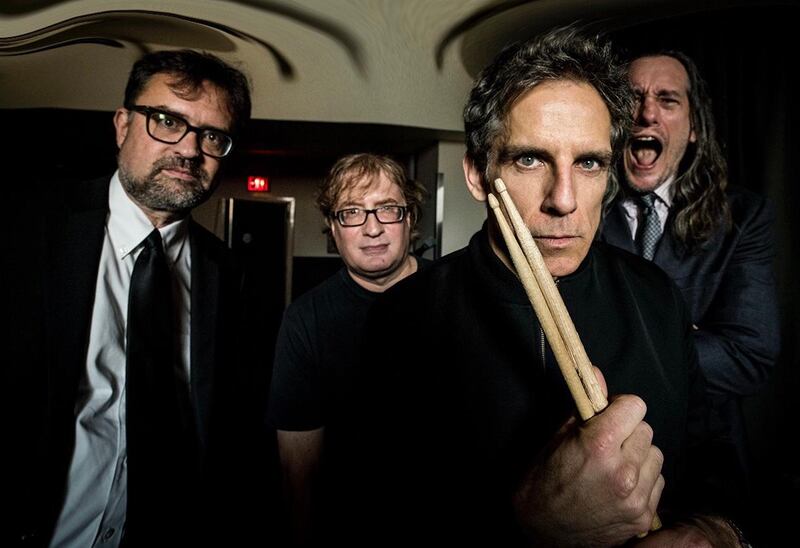For every middle-aged punk rocker still playing live, with their spiky grey hair and increasingly difficult trousers, there are many, many more who gave it up to get regular jobs.
Take the members of Capital Punishment, whose 1982 album, Roadkill, has just been re-released – a riot of experimental, sometimes disturbing noise. The electro-punk quartet boasted future movie star Ben Stiller on drums, but their bass player's eventual career was maybe an even greater departure: Peter Swann went on to become a Supreme Court judge in Arizona.
Now, you might imagine that Swann and Stiller would be embarrassed by that album’s re-emergence, but the band have actively promoted it. And why not? The gigging years tend to be fond, formative experiences, even for subsequent high achievers. They can also lay the groundwork for those future careers.
Ed Tracy, for example, a Bafta-winning TV and film producer who dabbled with urban beats in the 1990s, initially made "jungle tunes to play at DJing gigs", he tells The National. One of his impressive old mixtapes appeared online in January, and made quite an impact.
“I was living with a wannabe actor dude called Tom Hardy,” Tracy recalls. “He asked me to make some hip-hop beats – he was in to rapping. We ended up making about 20 tracks together. Music was always a hobby, so we didn’t release it at the time – my focus was on directing and producing film, TV. I can’t remember what happened to the other dude…”
Obviously, he can really, and hip-hop clearly did them no harm. Indeed, reports abounded recently that Hardy – star of new movie Venom – is now making a grime record. "#Fakenews" responded Tracy on Twitter, but the duo did collaborate again last year, on animated show Sticky. Tracy has also filmed with the likes of Hardy's Venom co-star Riz Ahmed, plus Dizzee Rascal and Banksy since that beatmaking era. It proved a good foundation.
“I think producing music has many similarities to producing and directing TV,” he says. “You provide the platform for the artist or actor to do their thing. You collaborate to bring a vision to the screen, or to the ear… can you bring a vision to the ear?”
Film and TV people “often have musical bones”, he suggests, and a solid rock/pop background can prove useful, later. Before comedy, Ricky Gervais was in a 1980s new-romantic duo, Seona Dancing, who were hotly tipped, split up, then had a belated hit in the Philippines, curiously.

He went on to manage popular Britpop band Suede, and eventually combined scriptwriting and songwriting. His finest creation, office manager and wannabe rocker David Brent, inspired a whole mock-rockumentary in 2016: Life on the Road. Gervais's co-star there, Doc Brown, was an almost-famous musician, too, rapping with Mark Ronson and Amy Winehouse, before comedy and acting called.
Can live music prepare you for other performing? Canadian stand-up comedian John Hastings was previously in several punk bands – those years yielded important lessons. "Punk shows taught me to hold a stage," he says. "I also think preparation and practice is something I carried over: 'Get ready to go on. Remember it's a show. Be ready. Being unprofessional on purpose is not cool.'"
Being in bands can definitely confer coolness, though, even years afterwards. Tony Blair was one of the UK's longest-serving prime ministers, rising to power in 1997, during the heady Britpop era. So his status was only enhanced when photographs emerged of the college band he fronted, Ugly Rumours. Their bassist, Mark Ellen, who is now a distinguished music writer, recalled that Blair's performances involved a "fairly polished Jagger impression".
Perhaps John Kerry should have highlighted his guitar-band past, too. The former US secretary of state was in 1960s rock outfit The Electras, where his role was to "look cool and play the bass", according to bandmate Andy Gagarin. Kerry played it down, and narrowly lost the 2004 presidential election to George W Bush. Twelve years earlier, Bill Clinton defeated George Bush Snr, after playing saxophone on Arsenio Hall's hip chat show. Music, it seems, helps.
Even super-brains sometimes have a pop past. Professor Brian Cox is a heart-throb physicist who lectures to huge theatres across the globe. In the 1990s, he graced stages behind a keyboard, with Irish dance-poppers D:Ream.
Cox's link gave D:Ream a handy post-heyday boost. Core duo Al Mackenzie and Peter Cunnah began performing again in the late 2000s (including in Dubai en route). Cox became a TV star in the meantime, then surprisingly re-joined, too. "He did a couple of bits on the [2011] album In Memory Of," Mackenzie says. "It should have helped… and, initially, did."
Cox’s return made the newspapers, but only briefly, intriguingly. “Brian was told by the powers that be that he wasn’t allowed to mention it,” Mackenzie reveals. “And we didn’t want to make a big thing of it.”
D:Ream – who return to the studio soon – had already made a sizeable footprint, anyway. In 1997 their hit Things Can Only Get Better became a successful election anthem for the aforementioned Blair, who interacted happily with Britpop stars. Is live gigging good preparation for important public figures? Famous scientists? Major politicians?
"Being in a band is great for anyone," says Mackenzie, who also helms dance act Field of Dreams. "I used to hate doing presentations when I worked in a bank, prior to DJing and being in the band. Now, the idea does not bother me, at all. It can only help your confidence."
The people who most often try to forget their old pop lives, ironically, are musicians. Alanis Morissette was a teen pop act in Canada before her edgier mid-1990s reinvention – those early albums were quietly deleted. Lana Del Rey’s past recordings – as the less stylised Lizzy Grant – were also withdrawn, pre-relaunch.
Perhaps most interesting is Seasick Steve. Legend had it that the grey-bearded bluesman was discovered on the streets, but it eventually transpired that Steve was much younger than claimed, and once fronted a disco act.
After a brief flurry of headlines, though, his fans seemed largely unfazed. A disco background is hardly the worst musical crime. Just ask the experimental electro-rock judge.
________________________
Read more:
For US celebrities, like Taylor Swift, no comment on politics is no longer an option
Israeli court fines two New Zealanders over Lorde gig opinion piece
Memory almost full: here's how to get your musical mojo back
________________________





